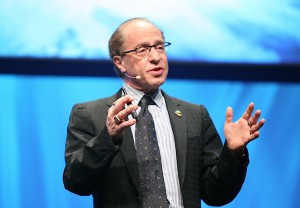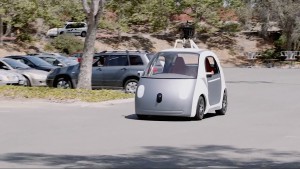
Ray Kurzweil, Google's director of engineering, believes that autonomous vehicles will be here sooner rather than later due to rapidly developing technology.
The steady growth of computing power is certain to disrupt the auto industry in the years to come, a top executive from Google said as the Society of Automotive Engineers opened its annual conference and exposition in Detroit.
Ray Kurzweil, a pioneer in the deployment of artificial intelligence who joined Google as the director of engineering in 2012, kicked off the SAE annual conference by noting that the rapidly declining cost of computing power and the advances in artificial intelligence will make autonomous driving sooner rather than later.
“Coming from Google, Google advised me to share with you they don’t know the answer,” he said by way of telling the attendees he was unsure to say when autonomous or self-driving cars will become a common sight on the world’s highways. But he was enthusiastic about the prospects for the future.
“The technology is not going to be introduced until its ready,” Kurzweil told the audience of several hundred automotive engineers from around the world who had gathered for the annual SAE meeting, which is held each spring in Detroit. But autonomous driving, utilizing artificial intelligence, is definitely coming, he said.
“The technology works. It’s not far away,” said Kurzweil, who is not only a computer scientist but also a noted author and futurist. He also said the need for autonomous vehicles is very clear.
“Google cars have gone close to a million miles without incident. Some day an autonomous car will cause an accident and it will be big news. But while we’ve been talking several people have died from human drivers. (Autonomous cars) are ultimately going to save millions of lives,” he said, noting that around the world traffic accidents kill 1.2 million people annually now.
“They also provide more efficient use roads and parking lots. There are a lot of benefits. But we’re not going to introduce them until they’re safe,” he said of the Google car project. “They have to be much more reliable than the technology they replace,” he said.
The appearance of the original Google Car touched off a race among the world’s automakers, many of which – Ford and Mercedes-Benz, Volkswagen and Nissan – have set up engineering centers near Google’s headquarters in Silicon Valley.
(Elon Musk nearly sold Tesla to Google. For more, Click Here.)
“People will still buy cars,” Kurzweil said. “But the Uber model with self driving cars will become very popular. We should share our cars. I think that model will grow when we have autonomous cars.”
“Every company has to reinvent itself, not everything is predictable,” Kurzweil added.
Kurzweil said up until now the transportation industry of which the automobile business is parts has not been considered part of the digital world. “But we see information of every kind coming into every form of transportation,” he said.
At the same time, the price of information is dropping dramatically.
(Click Here for details about Delphi’s autonomous cross-country trek.)
Kurzweil said disruptive technologies become feasible at different time. Search engines, such as the one developed by Google, became feasible in the late 1990s because of the steady, exponential growth in computing power. If you tried to build a search engine after that, you “missed your opportunity,” he said. “But if you are running a business you can anticipate when changes will occur.”
There is one is one aspect of the future you can predict reliably, he added.
“The price performance and the capacity of information technology follows a very predictable path and that path is exponential not linear,” said Kurzweil.
Other technologies such as batteries for electric cars have not changed dramatically as computing power, he said. “I think we’ll see that when we get to more mature phase of nanotechnology where you can manipulate matter on the atomic level that 10 or 15 years.
(To see more about whether Google and Apple will be allies or enemies, Click Here.)
Other technology, such as solar power, is developing more quickly than many experts expected, he said.
“Solar power is growing exponentially its doubling every two years. In many parts of the world, its reached parity with fossil fuel,” Kurzweil said.


AVs will serve some people well – once all of the issues are resolved which could be 10+ years off.